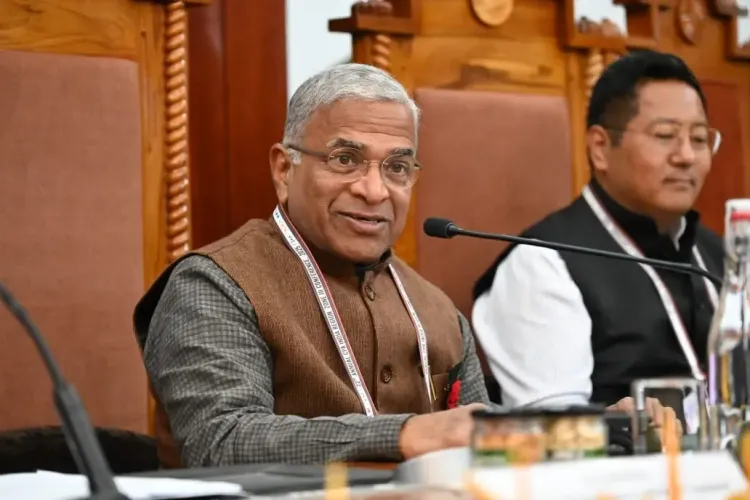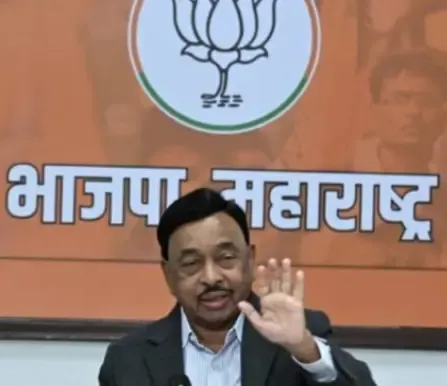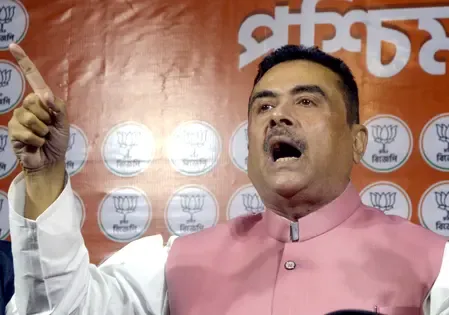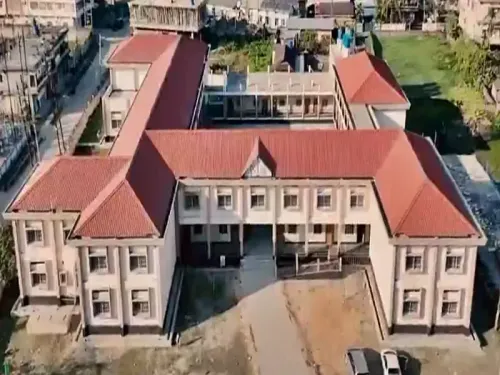How Should Legislatures Address Structural Changes Due to Climate Change? RS Deputy Chairman Harivansh

Synopsis
Key Takeaways
- Proactive Planning: Legislatures must take active measures in addressing climate change.
- Resilient Policies: Frameworks should be designed to prevent future damages.
- Focus on Viksit Bharat: Annual discussions are essential for long-term development.
- Sustainable Development: Economic growth should align with environmental goals.
- Technological Adoption: Embracing innovation is crucial for governance.
Kohima, Nov 11 (NationPress) Rajya Sabha Deputy Chairman Harivansh emphasized the necessity for legislatures to adopt a proactive stance in planning for structural changes driven by climate change. He urged them to not only adapt but also to devise strategies that can prevent future damages through resilient policy frameworks.
Speaking at the 22nd Annual Commonwealth Parliamentary Association (CPA), India Region Zone–III, second-day conference in Kohima, Harivansh highlighted the collective responsibility to bolster parliamentary democracy while promoting sustainable and inclusive development in the Northeast. He reiterated that India@2047 is not just a target but an ongoing journey characterized by smaller, measurable objectives tailored to the specific needs of each state.
He commended regional members for their valuable insights during the plenary discussions, particularly Assam Speaker Biswajit Daimary, who pointed out the importance of raising awareness about the concept of Viksit Bharat at the constituency level.
As India’s economy progresses, Harivansh noted that the landscape of work and employment will also evolve. Legislatures will thus play a pivotal role in not only crafting policies but also guiding citizens through this socio-economic transition.
He praised Sikkim’s Deputy Speaker for the state’s remarkable achievement as India’s first fully organic state in 2016, showcasing how economic growth can harmonize with environmental sustainability and the national Sustainable Development Goals.
Harivansh pointed out the Union government’s ongoing commitment to the Northeast, stating that 10 percent of the Union Budget is allocated for the region.
From 2017 to August 2023, the Ministry of DoNER has facilitated 126 Externally Aided Projects valued at Rs 1.35 lakh crore, while the Department of Economic Affairs has suggested 124 projects worth Rs 1.26 lakh crore for external funding over the last decade.
He underlined that the genuine impact of these initiatives hinges on effective legislative oversight and accountability.
“Legislatures must ensure thorough monitoring and that implementation aligns with intent,” he remarked.
Quoting Meghalaya Speaker Metbah Lyngdoh, he emphasized that tackling inefficiencies in land and labor laws and ensuring inclusivity can enhance investor confidence and attract fresh opportunities to the region.
Harivansh urged every state legislature to conduct annual discussions on Viksit Bharat, prioritizing policy reviews that foster long-term development.
He observed that improved infrastructure, the growth of agro-processing industries, and eco-tourism in the Northeast are already producing promising growth outcomes, noting that the Prime Minister’s emphasis on the Act East Policy positions the region at the center of India’s development vision.
Acknowledging the progressive approach of Northeastern legislatures in adopting technology, Harivansh stressed that innovation and research will be crucial in shaping governance and economic development.
Harivansh also highlighted the region’s unique ecological challenges, recalling remarks from Nagaland Chief Minister Neiphiu Rio about the delicate balance between abundant natural resources and the constraints on their commercial utilization. He urged that discussions on environmental protection and sustainable development must persist into the next decade.
Reflecting on his visit to Khonoma Village, Asia’s first green village, he praised it as a “living example of sustainable living,” emphasizing that individual actions can collectively contribute significantly to environmental protection.
During discussions on climate change, Harivansh noted that natural disasters in the Northeast illustrate how environmental shocks can lead to severe social and economic disruptions.
He reiterated the call for legislatures to proactively plan for structural shifts arising from climate change, advocating for not just adaptation but also for prevention of future damages through resilient policy frameworks.
The Commonwealth Parliamentary Association (CPA), established in 1911, facilitates collaboration among its members through conferences, workshops, and the exchange of knowledge and best practices.
As an international body, the CPA consists of over 180 legislatures from 53 Commonwealth nations, encompassing national, state, and territorial parliaments.
Currently, the Commonwealth is home to 2.7 billion individuals, with over half originating from India, now the world’s most populous nation.
“Prime Minister Narendra Modi envisions making India a developed country by 2047 with a 10 Trillion Dollar economy. To realize this vision, sustained high GDP and per capita income growth are essential, achieved through policies that promote innovation and self-reliance while ensuring social inclusion and equity by eradicating poverty and inequality, providing universal access to quality healthcare and education, achieving gender equality, and bridging the urban-rural divide,” added the Rajya Sabha Deputy Chairman.
India must develop localized solutions and software not only as substitutes but also to counter dependencies, akin to China, safeguarding against scenarios where the US blocks access to its software, as witnessed recently.
Significant progress has been made regarding the economy's size and various socio-economic, health, and development indicators, which are evident and manifest to all, he noted.










